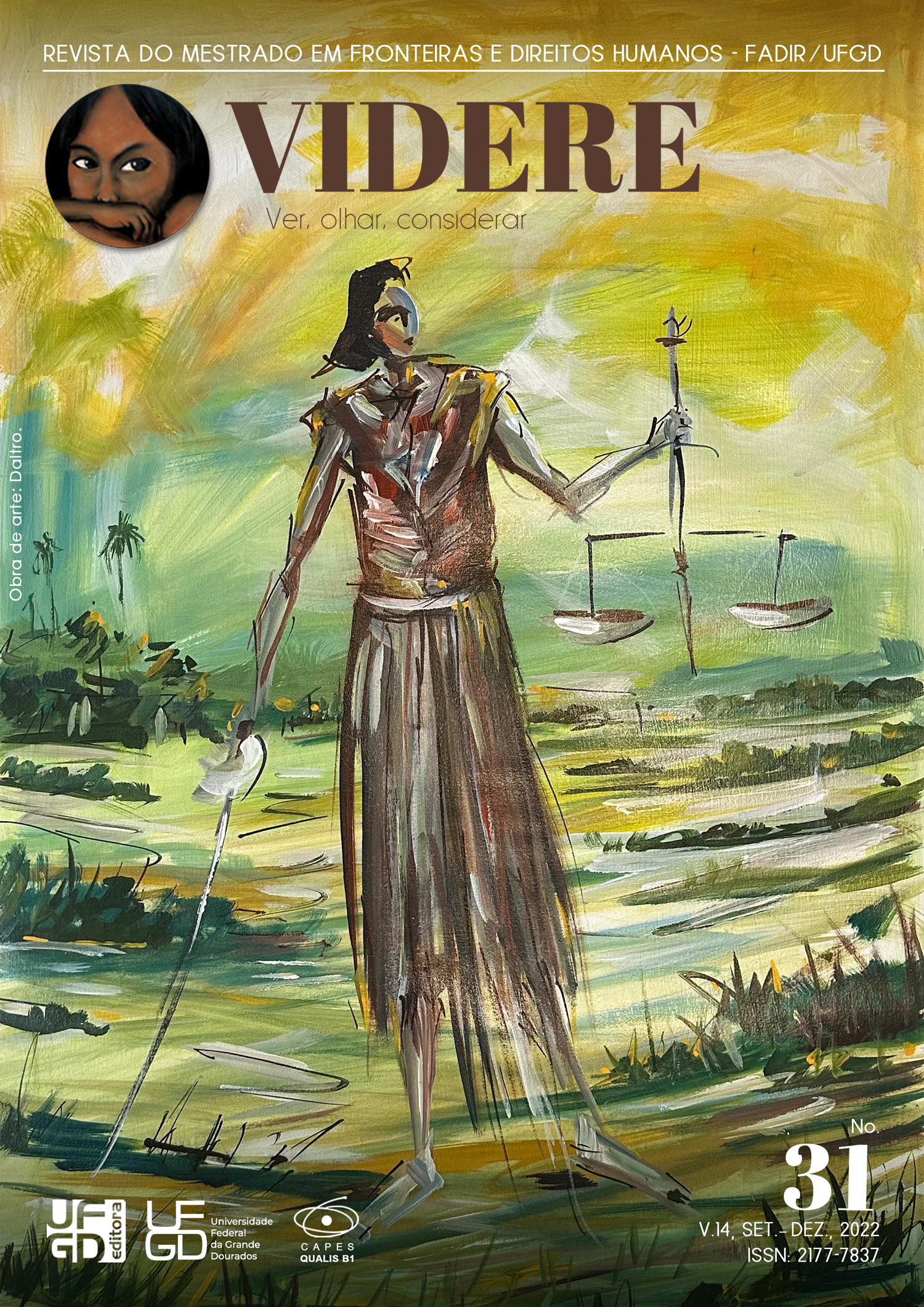IMPLICATIONS OF SUSTAINABLE CONSUMPTION FOR INTEGRATED RISK MANAGEMENT
DOI:
https://doi.org/10.30612/videre.v14i31.16910Keywords:
Management. sustainable. consumption. production. environment.Abstract
La sociedad ha adoptado hábitos de consumo que contribuyen a problemas ambientales y sociales, por lo que el desarrollo sostenible se ha vuelto un tema relevante. Este busca asegurar que las futuras generaciones tengan acceso a los mismos recursos que las actuales mediante una gestión responsable y eficiente de los recursos naturales. La gestión integral de riesgos es una herramienta importante para lograrlo, pues identifica y gestiona los riesgos relacionados con los patrones de consumo y producción. Se debe examinar cómo afecta el consumo al medio ambiente, desde la contaminación del aire y agua hasta el deterioro de los ecosistemas y pérdida de biodiversidad. El consumo y producción sostenibles se relacionan con la gestión integral de riesgos, y su adopción puede ayudar a reducir los riesgos ambientales y sociales que generan los patrones de consumo no sostenibles.
Downloads
References
BAUMAN, Zygmunt. (2007) Vida de Consumo Buenos Aires, Fondo de Cultura Económica.
Comisión de Naciones Unidas para el Desarrollo Sustentable. (1995) DISPONIBLE EN: https://daccess-ods.un.org/TMP/1021809.13090706.html
Marco de Sendai para la Reducción del Riesgo de Desastres 2015-2030 “Versión en español”
Disponible en https://www.unisdr.org/files/43291_spanishsendaiframeworkfordisasterri.pdf
MESA Redonda sobre Producción y Consumo Sostenible, Oslo, 1995 https://daccessods.un.org/TMP/2684151.23224258.html
NACIONES Unidas, Cumbre de Johannesburgo, en https://www.un.org/spanish/conferences/wssd/modelos_ni.htm#:~:text=El%2015%25%20de%20la%20poblaci%C3%B3n,solamente%20del%2011%25%20del%20consumo.
Objetivos de Desarrollo Sostenible; Objetivo 12: Consumo y producción sostenible [Consultado 6 de abril de 2021] Disponible en: https://www.ve.undp.org/content/venezuela/es/home/post-2015/sdg-overview/goal-12.html
ORGANIZACIÓN DE LAS NACIONES UNIDAS. (s.f.). Agenda 21. Disponible en https://www.un.org/esa/sustdev/documents/agenda21/spanish/a21_summary_spanish.pdf con acceso el 15 de abril de 2021
ORGANIZACIÓN DE LAS NACIONES UNIDAS NU/EIRD Nota Informativa No. 1, Ginebra, setiembre del 2008 DISPONIBLE EN: https://cidoc.marn.gob.sv/documentos/el-cambio-climatico-y-la-reduccion-del-riesgo-de-desastres/
ORGANIZACIÓN DE LAS NACIONES UNIDAS Declaración de Río sobre el Medio Ambiente y el Desarrollo 1992 DISPONIBLE EN https://www.un.org/spanish/esa/sustdev/agenda21/riodeclaration.htm
ORGANIZACIÓN DE LAS NACIONES UNIDAS (2004) Vivir con el Riesgo: Informe mundial sobre iniciativas para la reducción de desastres DIPONIBLE EN https://www.eird.org/cd/building-codes/pdf/spa/doc16481/doc16481-1ane.pdf con acceso el 15 de abril de 2021
Programa de las Naciones Unidas para el Desarrollo 2012 Cuadernillos de Gestión del Riesgo de Desastres a nivel regional y local
DISPONIBLE EN https://www.preventionweb.net/files/38050_38050conceptosbsicos.pdf
Rastelli Montbrun, Victoria, & Chacón, Rosa María (2014). La reducción del riesgo ante desastres y la sostenibilidad urbana. Politeia, 37(53),81-111.[fecha de Consulta 15 de Abril de 2021]. ISSN: 0303-9757. Disponible en: https://www.redalyc.org/articulo.oa?id=170046633003
UNCTAD. UNCTAD/DITC/TED/2007/4. (2007) Publicación de las Naciones Unidas. DISPONIBLE EN: https://unctad.org/system/files/official-document/ditcted2007d8_es.pdf
UNEP-IRP (2019) “Tendencias en el uso de los recursos en América Latina y el Caribe” Disponible en: https://wedocs.unep.org/bitstream/handle/20.500.11822/30852/uso_recursos_lac.pdf?sequence=2&isAllowed=y
UNESCO (2002) Manual de educación para un consumo sostenible youth x change (VERSIÓN EN ESPAÑOL) DISPONIBLE EN https://www.euskadi.eus/contenidos/documentacion/youthxchange/es_doc/adjuntos/youthxchange.pdf
UNESCO / UNEP, (2002) “Jóvenes por el Cambio: Manual de educación para un consumo sostenible”.
Downloads
Published
How to Cite
Issue
Section
License
Copyright (c) 2023 Revista Videre

This work is licensed under a Creative Commons Attribution-NonCommercial-ShareAlike 3.0 Unported License.
Authors must accept the publication rules when submitting the journal, as well as agree to the following terms:
(a) The Editorial Board reserves the right to make changes to the Portuguese language in the originals to maintain the cultured standard of the language, while respecting the style of the authors.
(b) Authors retain the copyright and grant the journal the right to first publication, with the work simultaneously licensed under the Attribution-NonCommercial-ShareAlike 3.0 Brazil (CC BY-NC-SA 3.0 BR) that allows: Share - copy and redistribute the material in any medium or format and Adapt - remix, transform, and create from the material. CC BY-NC-SA 3.0 BR considers the following terms:
- Attribution - You must give the appropriate credit, provide a link to the license and indicate whether changes have been made. You must do so under any reasonable circumstances, but in no way that would suggest that the licensor supports you or your use.
- NonCommercial - You may not use the material for commercial purposes.
- Sharing - If you remix, transform, or create from material, you must distribute your contributions under the same license as the original.
- No additional restrictions - You may not apply legal terms or technological measures that legally restrict others from doing anything that the license permits.
(c) After publication, authors are allowed and encouraged to publish and distribute their work online - in institutional repositories, personal page, social network or other scientific dissemination sites, as long as the publication is not for commercial purposes.



















